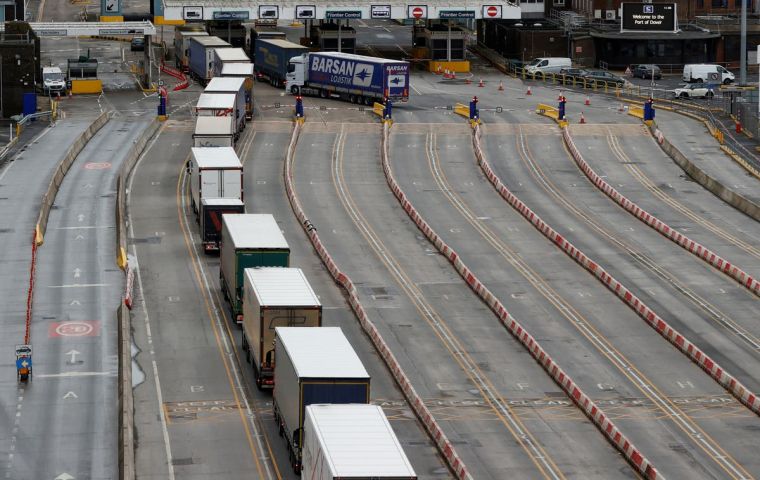MercoPress. South Atlantic News Agency
UK/EU post Brexit first month trade figures are not encouraging
 British goods exports to the EU, excluding non-monetary gold and other precious metals, slumped by 40.7% in January compared to December, ONS said
British goods exports to the EU, excluding non-monetary gold and other precious metals, slumped by 40.7% in January compared to December, ONS said UK/European Union trade contracted in the first month of their new post-Brexit relationship, with record falls in British exports and imports of goods as COVID-19 restrictions continued on both sides.
British goods exports to the EU, excluding non-monetary gold and other precious metals, slumped by 40.7% in January compared to December, the Office for National Statistics said on Friday. Imports fell by 28.8% - another record.
The ONS said the COVID-19 pandemic, which left Britain under lockdown measures in January, made it hard to quantify the Brexit impact from new customs arrangements, and there were changes in the way data was collected too.
Trade in chemicals was especially weak, reflecting the winding-down of a rush to stockpile pharmaceuticals ahead of the end of the Brexit transition period, the ONS said. The ONS highlighted a 64% fall in exports of food and live animals to the EU - including shellfish and fish.
It pointed to delays caused by red tape reported by the Scottish Seafood Association, with consignment sign-offs reportedly taking six times longer.
“External evidence suggests some of the slower trade for goods in early January 2021 could be attributable to disruption caused by the end of the transition period,” the ONS said.
Many companies stockpiled goods in late 2020 to avoid any disruption, deepening the fall in trade in January.
The ONS said its separate business survey suggested that trade picked up towards the end of the month.
Britain on Thursday delayed the introduction of a range of post-Brexit import checks on goods from the EU by around six months, saying businesses needed more time to prepare because of the impact of the pandemic.
Prime Minister Boris Johnson says Britain’s new independent trade policy means it can focus on deals with faster-growing economies around the world, although many trade analysts are sceptical that this boost will outweigh lost EU trade.
Britain’s official budget forecaster says the country’s new trade arrangements with the EU, the world’s biggest single market, will erode its long-run productivity by 4% compared with staying in the bloc.
“This month’s unique combination of factors made it inevitable that we would see some unusual figures this January,” said David Frost, a senior minister who was Johnson’s chief Brexit negotiator.
Economists say the hit to EU trade - and any benefits from Brexit - will become clearer.
Britain’s overall goods trade deficit, including non-EU countries, narrowed to 9.826 billion pounds (US$ 13.70 billion) in January from 14.315bn pounds in December.




Top Comments
Disclaimer & comment rulesCommenting for this story is now closed.
If you have a Facebook account, become a fan and comment on our Facebook Page!